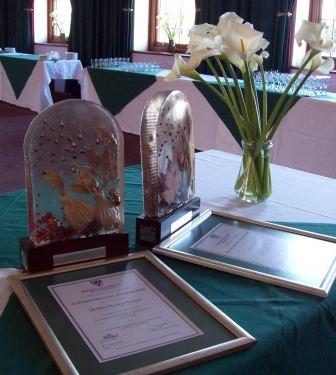
On Tuesday 29 September Rhodes University’s Environmental Committee hosted the 2015 Environmental Awards. This year’s event saw Caleena de Carvalho, WildREACH and Elisma Hallier winning the awards in the Rhodes University individual category, RU Student Society/Residence category, and the Makana Community category respectively.
Professor Martin Hill, head of RU Biological Control Research Group (BCRG) and a leading authority on aquatic invasive weeds and their biological control, was the guest speaker for the evening. Among his accolades are winning a 2014 Environmental Award with his BCRG Mass Rearing Programme, which also won this year’s National Science and Technology Forum’s Green Matter Award for their outstanding work in promoting biodiversity, conservation, environmental sustainability, and a greener economy.
Hill encouraged tackling environmental issues through an everyday approach, also calling the University to task by suggesting the possibility of sourcing food from within the greater Grahamstown area and thus enhancing the productivity of local farmers and cutting down on the carbon footprint. Hill ended his speech with a quote from the Rabbi Hillel, “If not me, who? If not now, when?”
The winners each received a floating trophy and framed certificate handed over to them by Deputy Vice-Chancellor Dr Peter Clayton.
Winner of the Rhodes University Individual category, Caleena de Carvalho was chosen for her deep commitment to environmental issues and sustainability, having performed practices that promote human and ecological health. Last year de Carvalho won a Hall Award for her participation in the Hall vegetable garden, this year continuing to make her Hall proud, both as her residence’s environmental representative, and as secretary of the RU Green Committee and as the recently appointed president of RU Green for 2016. In her residence, de Carvalho maintains a safe and healthy environment in line with the Rhodes Environmental policy incorporating sustainability, education, sustainable waste management, water and energy use, responsible purchasing and community engagement. Students were invited to sign the policy, through this pledging to use resources in a sustainable way. De Carvalho also created environmental awareness through informational posters that were displayed within residence about electricity consumption and water usage and she took initiative by setting up recycling stations and vegetable garden outings where produce was distributed to underprivileged members of the community.
Winner in the Rhodes University Student Society/Residence Category was the WildREACH team, a non-profit student group established in 2011. Through organising educational trips to game reserves and sea shores, WildREACH served to enhance the lives of learners from disadvantaged communities. The trips allowed such learners to engage meaningfully with biodiversity and conservation. Through a collaborative project with Prof Hill’s Biological Control Research Group starting in 2013, WildREACH introduced learners to scientific research methods on a weekly basis. The group’s environmental efforts within the Rhodes community include promoting an understanding of ecological issues in low-cost effective ways. Collen Vusie Mabaso and WildREACH president Samantha Wendy Houghton received the award. “It’s really nice to get recognition, it’s not what we work for, but it’s really nice for people to see what we do as well” said Houghton. “It gives us hope for the future, we hope the new comm will be inspired doing such work based on the environment and sustainability but also community engagement,” said Mabaso.
The final award for the evening in the Makana Community category was handed to Elisma Hallier, who is at the forefront of Kuyasa Special Needs School’s EcoSchools programme. The EcoSchools programme promotes environmental sustainability within a school’s curriculum. Hallier has introduced various environmentally sustainable practices to her students, including teaching them how to set up worm farms, harvest worm juice, indigenous gardening and greywater recycling techniques. In 2012 the school was awarded an international EcoSchools award and since then has seen two successive years of platinum status. Hallier attributed the school’s success to the pupils. “They are my inspiration”, she said.
“This is the best line-up of nominees that we’ve ever had,” said Rhodes University Safety Health & Environmental officer Nikki Kohly, who is also an active member of the Environmental Awards Working Group. “We were so impressed by the standard. Thanks to everyone who put themselves out there, they really do serve as a source of inspiration.”
By Tamani Chithambo
